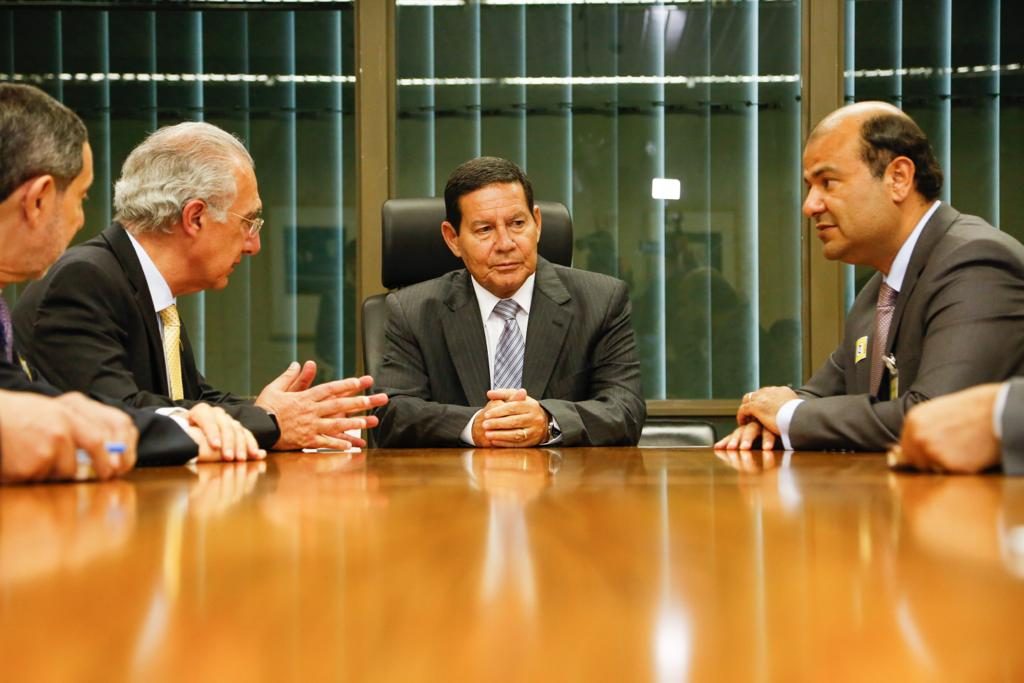São Paulo – Arab Brazilian Chamber of Commerce president Rubens Hannun and Union of Arab Chambers secretary-general Khaled Hanafy met Brazil acting president Hamilton Mourão (photo above) and minister of agriculture Tereza Cristina in Brasília this Tuesday (29) to discuss how to strengthen economic and trade relations between Brazil and the Arab world. VP Mourão occupies the office ad interim because president Jair Bolsonaro is recovering from an abdominal surgery carried out Monday (28).

“Talks were quite productive relatively to trade,” Hannun told ANBA. “Private initiative, the acting president and the minister are very interested, seeing very interesting perspectives,” he stressed.
Hannun and Hanafy invited Mourão and Cristina to participate in the Arab forum on food safety scheduled to occur in H2 2019. Brazil is already a large food supplier for the Middle East and North Africa, specially of meat and poultry, but the countries in the region are very concerned with the supply guarantee, because they have a low production capacity and rely on imports.
In an interview to the newspaper Valor Econômico published this Tuesday, Hanafy suggested an increase in the processing of Brazilian raw materials, such as soy, in Middle East countries, and the establishing of logistic poles in Arab ports in order to receive Brazilian products and distribute them to the markets of the region and even beyond them.
He also said to the newspaper that Arab entrepreneurs are concerned with the possibility Brazil moves its embassy in Israel from Tel Aviv to Jerusalem, a topic he called “very critical.”

Based in Beirut, Lebanon, the Union of Chambers is a League of the Arab States branch for the private sector, reuniting chambers of commerce from the Arab countries and outside the region, such as the Brazilian.
Hannun had already met with Mourão, then VP-elect, in December, when he handed him a study about the potential for growth of Brazilian-Arab relations elaborated by Arab Brazilian Chamber. The document estimates, for example, that exports to the region could amount to USD 20 billion in 2022, compared to USD 11.5 billion in last year, and that the improved economic relations could create 300,000 jobs during that time.
This Tuesday, the Chamber presented minister Tereza Cristina a specific study on the potential of business between Brazil and the Arab world in the agribusiness area. The report suggests measures to make Brazil the third largest trade partner of the Arab world. It is now the fifth. Hannun told the minister intends to travel to the region. “She is aware of the importance of the Arab countries for the sector and wants to deepen the relations through the Arab chamber,” he stressed.
Hannun added that contacts with the new Brazilian government have been promising and stressed the partnership between Arab Brazilian Chamber and the Union of Arab Chambers is well-structured and may provide support for both the private initiative and the public sector. “There is interest in Brazil and many potential to be developed, we are on the right track,” he said.

BRF
Earlier in São Paulo, Hannun and Hanafy had met with Pedro Parente, president of BRF, the holding that owns brands such as Sadia and Perdigão. Arab countries are one of the main international markets of the company . The company even has a food factory in Abu Dhabi, United Arab Emirates, and equity stake in several distributors in the region. According to Hannun, Parente is also “aware” of the potential consequences of moving the embassy.
Also present in this Tuesday meetings were Arab Brazilian Chamber foreign relations vice-president ambassador Osmar Chohfi, and secretary-general Tamer Mansour.
The group stays in Brasília this Wednesday for meetings with Brazilian Export and Investment Promotion Agency (Apex-Brasil) president Mário Vilalva, and Senate Committee of Foreign Relations president Fernando Collor.
Translated by Guilherme Miranda




